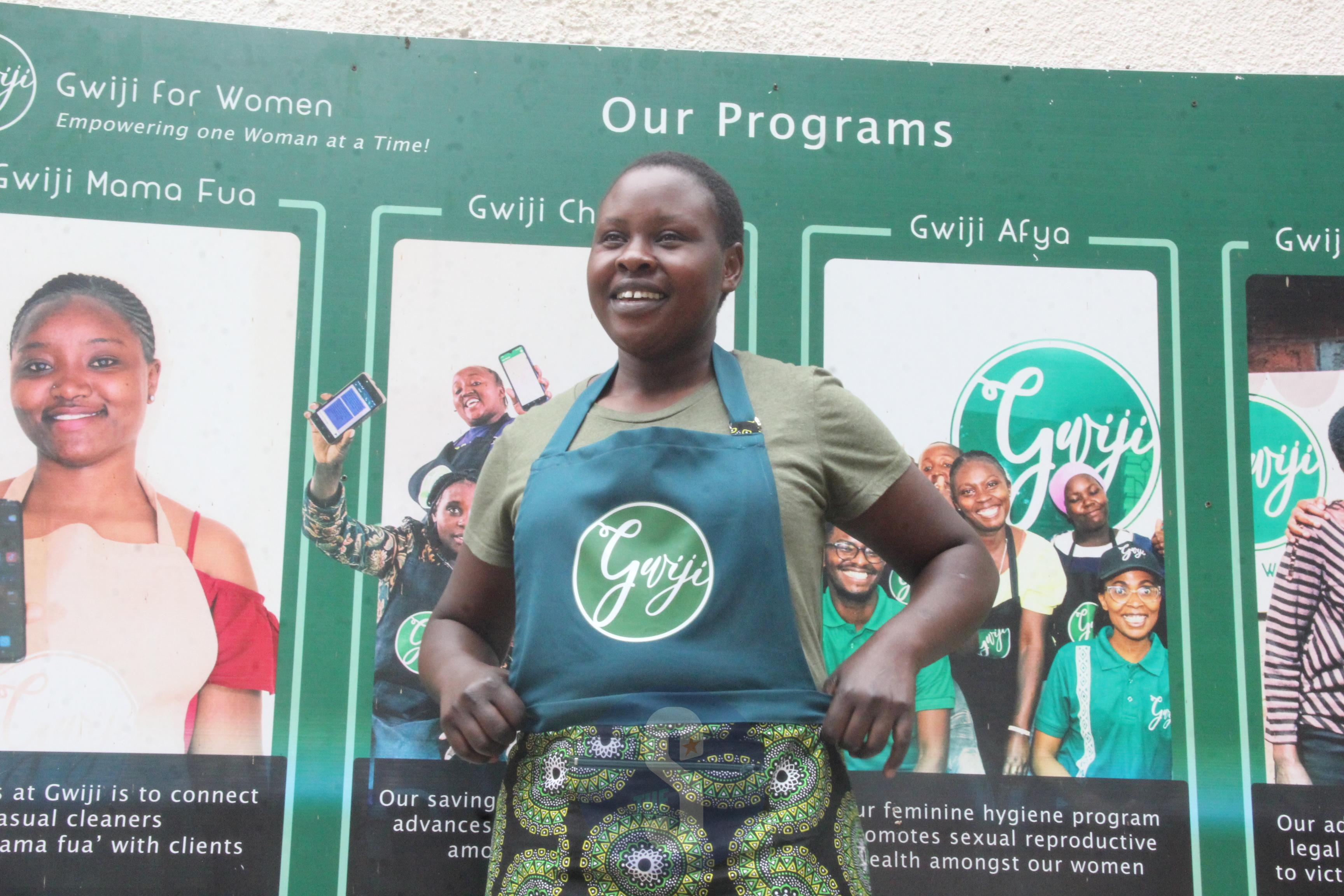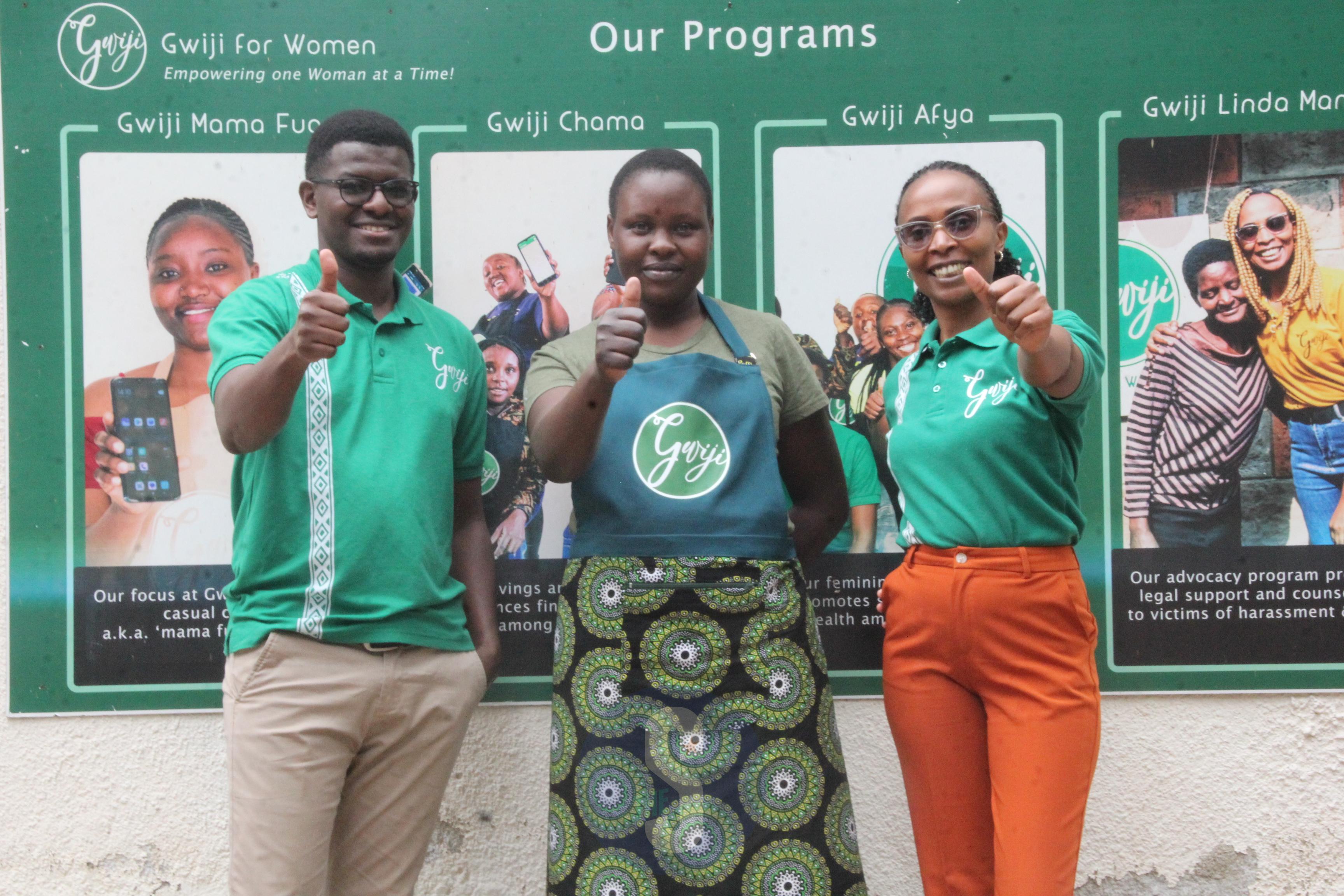 Gwiji for Women employee Agnes Kerubo speaking to the Star on July 8, 2025 / TRACY MUTHONI
Gwiji for Women employee Agnes Kerubo speaking to the Star on July 8, 2025 / TRACY MUTHONIEvery morning, Agnes Kerubo would make her way to her favourite stone at a familiar corner in South B, not to relax or pass time, but with the hope of finding a job that could put food on the table for her family.
Under the scorching sun and through harsh weather, Kerubo, a mother of one, sat at the same spot where people had grown used to seeing her, waiting for someone who might need help with domestic chores.
Sometimes she got lucky, but often she returned home empty-handed, her day having passed with no work and no pay.
For Kerubo, the struggle was deeply personal. She had already begun making arrangements to travel to Saudi Arabia in search of better-paying domestic work, driven by desperation to support her family.
Her life had reached a point where stability
seemed like a far-fetched dream.
One day, as she flipped through a local newspaper during her usual wait, something caught her eye: an advertisement for the recruitment of cleaners by Gwiji for Women.
With no time to waste, she gathered her documents and rushed to their offices. That decision would mark the turning point in her life.
Gwiji for Women is an online platform that connects women in informal settlements to clients in need of cleaning services in homes and short-term stay accommodations.
Through its mobile app, the platform has created a digital gateway for women like Kerubo to access reliable job opportunities.
“When I was employed by Gwiji, it moved me from a dark place in life. I could not eat or do anything decent. But after that, I became stable and was able to provide food to my family,” she said.
Kerubo never imagined she would one day find herself in the domestic work industry, but she says the job has become a source of pride and strength.
She pushes herself every day to improve and provide for her child, no matter the challenges.
Today, Kerubo is assured of job orders at least two days a week, typically on Thursdays and Saturdays.
The rest of the days, she actively hunts for work through the Gwiji app, reaching out to clients
“My work is in two sections. In a week, I will do the job for two days that I have been booked. The rest of the days I hunt for orders on the app, agree with the client and go to work,” she explained.
A typical day starts with anticipation and careful planning. She communicates with clients in advance to understand their expectations. For her, professionalism and hard work are non-negotiable values.
“No work is easy; it is your hard work. There is no decent or non-decent work. It is your passion and drive that pull you through it all,” she added.
Like any job, cleaning has its challenges. Kerubo says some clients are difficult and overly cautious, monitoring her every move through CCTV cameras out of fear of theft.
Still, she understands their concerns and has earned the trust of many, who now leave her with their house keys to clean in their absence.
Kerubo now earns approximately Sh1,500 per day, accumulating around Sh7,000 a week. It’s a steady income that allows her to provide for her family and plan for the future.
“I am okay with that amount because I am now stable and able to provide for my family,” she said.
The Gwiji app has also simplified payments. Clients upload their payment based on the amount of work, with a required minimum of Sh1,000.
Kerubo says this system has eliminated the stress of price negotiations and ensures fair compensation.
Her days of waiting endlessly at a street corner are now behind her. Through Gwiji for Women, Kerubo has reclaimed dignity, found consistency, and most importantly, brought hope back into her home.
GWIJI FOR WOMEN APP
A quiet revolution is sweeping through informal settlements, transforming the lives of countless women previously relegated to low-paying domestic work.
At its heart lies the powerful combination of accessible smartphones and the innovative "Gwiji for Women" app.
The digital platform is not just connecting clients with cleaners, but reshaping economic empowerment for a vital, yet often overlooked, workforce.
Gone are the days of "mama fua" (casual cleaners) waiting aimlessly at estate gates for a day's work.
Today, armed with increasingly affordable smartphones, women are tapping into the Gwiji App, receiving cleaning orders directly to their devices.
Gwiji for Women is an online platform that connects women in informal settlements to clients in
need of cleaning services.
It is in the form of two apps, a client’s app which is for clients posting their jobs and the cleaner’s app for cleaners who have been trained, vetted and onboarded.
The app is available on the Google Play Store and App Store, allowing clients to place jobs they need done.
The client inputs everything they want done, the time and date they want the cleaner to do the job and how much they are paying based on the minimum wages.
The cleaner picks the job based on the details that have been provided by the client.
This is done
based on the availability and location; cleaners pick a job that's within their
location because they are familiar with the area and cut costs on transport.
Cleaners are recruited onto the platform through vetting and training for three days.
The rigorous training includes how to use the application, washing machine, vacuum cleaners and ironing to boost their confidence when they start working.
They are also taught professionalism and basic communication skills.
Interested candidates are required to have their Identification Documents and should be 18 years and above.
They are also required to have documentation such as a letter from the Chief for accountability in case of anything.
The Gwiji App has a feature called the SOS button, in case a cleaner doesn't feel safe on the platform, they can press it and will notify the management for help.
 Gwiji for Women Head of Operations and Co-founder Samuel Njeru, Gwiji employee Agnes Kerubo and Gwiji founder and CEO Elizabeth Mwangi on July 8, 2025 / TRACY MUTHONI
Gwiji for Women Head of Operations and Co-founder Samuel Njeru, Gwiji employee Agnes Kerubo and Gwiji founder and CEO Elizabeth Mwangi on July 8, 2025 / TRACY MUTHONI
BRAINS BEHIND GWIJI
“Being the best” isn’t just a slogan; it is a mission that drives Elizabeth Mwangi, the founder of Gwiji for Women, to uplift and empower women across Kenya’s informal settlements through technology and opportunity.
Founded in 2020, with its app launched in May 2022, Gwiji connects trained domestic workers to clients across Nairobi, including Kajiado, Machakos and Kiambu counties.
What began in Lang'ata with just 300 women has now grown to more than 3,800 onboarded, with 2,000 active cleaners offering reliable, dignified services daily.
Elizabeth’s journey is rooted in her mother’s struggle. A domestic worker who left at dawn and returned late, her sacrifices inspired Elizabeth to build something better for women like her.
While still at university, Elizabeth volunteered with an NGO to place women from slums in household jobs. When the project ended, she realised the work didn’t have to stop.
“Women kept calling me for work, and I realised I could connect them directly with clients,” she said.
With no tech background and fresh from university, Elizabeth brought on a co-founder with IT expertise, and together, they built the Gwiji mobile app.
The app, now a cornerstone of the project, is designed for simplicity. Women are trained to navigate it before joining the platform, from using smartphones to accepting jobs and receiving payments via integrated M-Pesa.
Training includes cleaning techniques, professionalism, communication, and safety awareness.
Despite initial challenges, including limited
access to smartphones and the internet, women quickly adapted.
Today, they confidently operate the app, manage schedules, and accept jobs within their locality to save on transport.
Elizabeth said that previously, women earned as little as Sh200 for a full day’s work. Now, through the app, they earn a minimum of Sh1,000 per job, keeping Sh800 after a 20 per cent commission.
With support from partners like Unilever, the Foreign Commonwealth and Development Office (FCDO) and Ernest and Young (EY) under the TRANSFORM initiative, Gwiji has extended its reach to nearly 10,000 women.
Unilever also supplies cleaning products sold through the app, and when a client prefers their products, the cleaners earn extra income.
More than just jobs, Gwiji is restoring dignity and financial stability to women once overlooked.
“Rent and school fees are no longer a struggle. These women now feel valued and seen,” Elizabeth said.
The Head of Operations and Co-Founder at Gwiji for Women, Samuel Njeru, oversees the day-to-day management of the enterprise, which connects clients with domestic cleaners.
His role includes handling client complaints, ensuring quality control, and promoting new services through social media.
“We receive complaints on the quality of services from clients and learners. Clients raise complaints about the cleaners' professionalism, while cleaners complain about the workload,” Njeru said.
To address these concerns, Gwiji incorporates client feedback into its training sessions. “When we are training, we tell cleaners of the client expectations, which we base on the complaints that we have received,” Njeru explained.
“One client would say the cleaner used too much of my resources, like soap. Another client would say they did not use enough. So, you see, in between there's a balance. So, we try to strike that balance for the clients.”
He added that every complaint is handled on a case-by-case basis to mediate between parties and ensure satisfaction on both ends.
Njeru, who co-founded Gwiji alongside Elizabeth, said he was immediately drawn to the idea of empowering women. He credits his mother, who raised him single-handedly, as his inspiration.
“I was brought up by my mother, she is the one who took me through school and who, you know, fed me and, you know, created all these opportunities for me,” he said,” he said.
“I felt investing in women is something that has returns beyond. I was excited for that opportunity. I came into Gwiji understanding the mission even more than the technical aspects of the operations.”
He noted that the Gwiji team was made up of shareholders without prior experience in the field, but the collaboration helped nurture the idea into a functional business.
Njeru acknowledged the progress made on gender balance in Kenya and emphasised the importance of value over quotas.
“You can regulate and say, you want this number of women to work in every organisation. But for us, we're more concerned with value. Are we providing value or are we just selling empowerment?” he said.
He cited the introduction of Gwiji Chama, a
savings initiative for women, as a development that emerged during the journey.
“We saw that maybe they earn money and they spend it on maybe new clothes, you know, something like that. You need to think more about your financial future.”
Looking ahead, Njeru envisions growth beyond Kenyan borders.
“You might see us in America. You don't know. You might find us there."
He encouraged young graduates to pursue entrepreneurship, regardless of their academic background.












